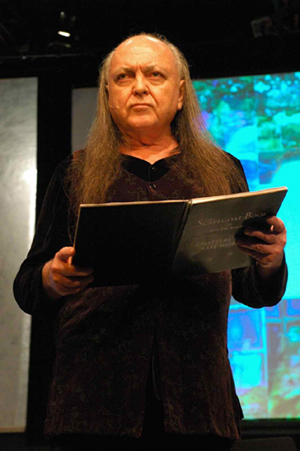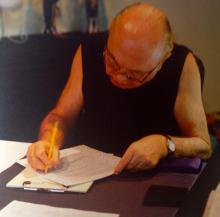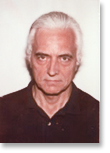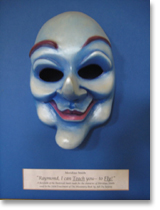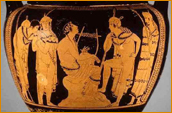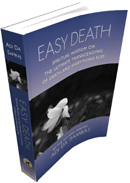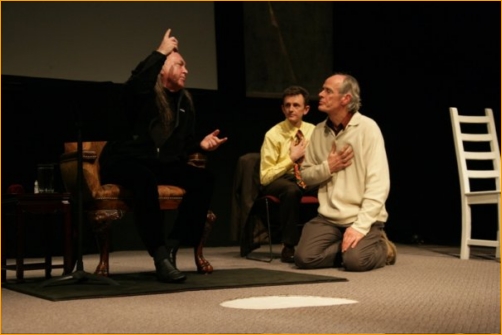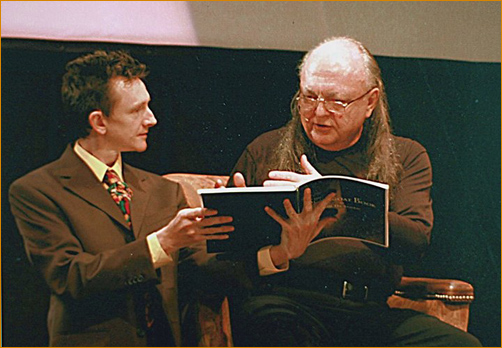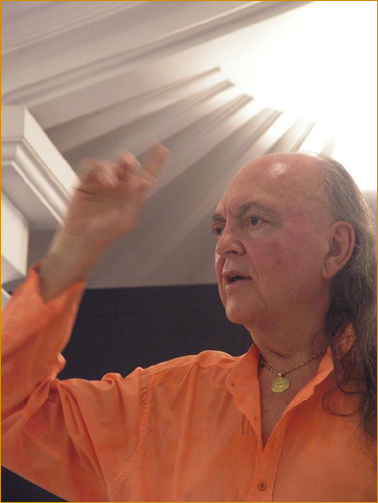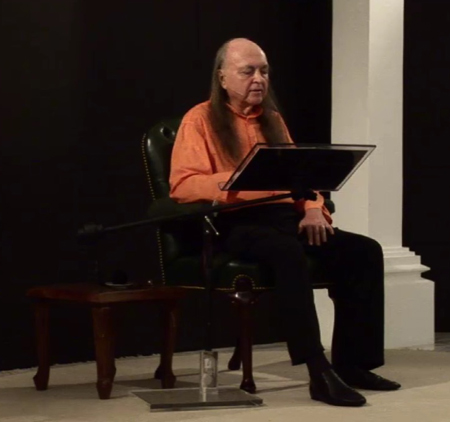|
The Sacred Literature and Theater
|
|||||||||||||||||||||||||||||||||||||||||||||||||||||||||||||||||||||||||||||||||||||||||||||||||||||||||||||||||||||||||||||||||||||||||||||||||||||||||||||||||||||||||||||||||||||||||||||||||||||||||||
| All of My Words, all of My Teaching, is Orphic. I Am Orpheus.
My Teaching-Work was going to Hades, coming to the common
"world". I have Accommodated every aspect of ordinary life,
but did not look back. Every moment of My Life is Poetry, is Ecstasy. It is the only way you can properly understand Me. . . I am Orpheus. My Birth is to wrest you from the results of your conditional preoccupations. And I must not look back. Avatar Adi Da Samraj, "Art Is Love" |
This section is organized as follows:
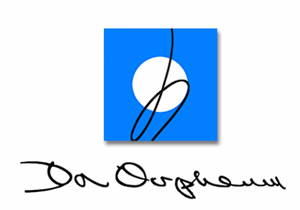
| The Orpheum is a Direct Expression and Sign of My Own Person
and Life. . . Indeed, it is upon the Base of My Orpheum
trilogy that I have Revealed and Given the entirety
of My Divine Avataric Teaching-Revelation. Avatar Adi Da Samraj, The
Aletheon
|
Adi Da's principal literary work [1]
is His trilogy entitled The Orpheum, and subtitled, "The
Tragic History of The Recent Return of Orpheus, or, The First
Room In Three Books". The trilogy is comprised of three volumes:[2]
The Mummery Book, The Scapegoat Book, and The
Happenine Book.
The Orpheum is also presented in theatrical form. The primary theatre is located in Middletown, California, a two-and-a–half hour drive north from San Francisco.
On various occasions over the years, Avatar Adi Da Himself recited The Mummery Book to groups of His devotees. On January 14, 2006, He recited the entire text of The Scapegoat Book in an enactment at The Mountain Of Attention Sanctuary. And, later in 2006, His gift of The Orpheum trilogy was fully completed with His Recitation of the complete Text of The Happenine Book (the longest of the three Books) in a series of occasions starting on April 22 and ending on May 10.
|
|
|
|||||||
|
||||||||
|
||||||||
|
|
|
|||||||
The Trilogy is Transcendental Realist Art. They're using visuals of Mine which is Transcendental Realist art. But they have to understand My Literary Work is Transcendental Realist art also, and therefore, the performance art being brought to my Literary and Visual art should be Transcendental Realist art. So that is abstract art in a particular mode, and it gives all kinds of possibilities, just as I do in My Image Art Work and in My Literary Art Work which they are performing. It's not merely conventional realism, and it's not ego realism. Avatar Adi Da Samraj, June 29, 2008
An aperspectival and anegoic, aniconic space should be used in the performance of The Mummery Book, The Orpheum Trilogy altogether, at least at certain times, in such a manner that the viewers can participate in that kind of space, that mode of spatial perception that is virtually infinitely fractioned and non-representational. What I'm talking about with the images that I'm making, is presenting them in a circumstance of mirroring and infinite reflectivity that extends from the anegoic, aniconic, aperspectival form intrinsic to the image itself that I've made. I'm talking about something that could be extended into the theatrical circumstance of The Orpheum Trilogy. Avatar Adi Da Samraj, April 12, 2008
|
| The Orpheum Trilogy is a Self-Portrait of Reality
Itself. It's not about anyone in an egoic sense. There is
no one for it to be about, in the egoic sense. That doesn't
mean it's a nihilistic presentation, no. It's a Reality matter,
a Divine matter. It's about the Love-Blissful Nature of Reality
Itself. Avatar Adi Da Samraj, April 17, 2008
|
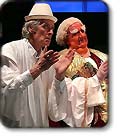 Avatar
Adi Da’s first great communication of Truth was His Mummery
Book, the original form of which He wrote in November, 1969 (in just three weeks), even
before the Great Event of His
Divine Re-Awakening (in September, 1970). He then expanded The Mummery Book to its current fullness in 1998, at Adi Da Samrajashram.
Avatar
Adi Da’s first great communication of Truth was His Mummery
Book, the original form of which He wrote in November, 1969 (in just three weeks), even
before the Great Event of His
Divine Re-Awakening (in September, 1970). He then expanded The Mummery Book to its current fullness in 1998, at Adi Da Samrajashram.
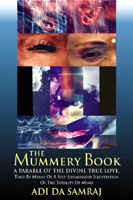 |
The full title is The Mummery Book: A Parable Of The Divine True Love, Told By Means Of A Self-Illuminated Illustration Of The Totality Of Mind. (The Mummery Book is available from The Dawn Horse press as a hardcover book and as a six and a half hour recitation by renowned actor, Ken Welsh. The Mummery Guild (now known as First Room Theatre Guild) presented the first full length theatrical presentation of The Mummery Book during the period of November through December, 1989. The first full recitation of the expanded Mummery Book would take place at The Mountain Of Attention on January 9, 1999. |
|
The appearance of The Mummery Book by Adi Da Samraj signals a remarkable occasion in the world of literature. It is a novel in the mode of a vast parable, in which mystical and esoteric states of awareness are fleshed in poetic imagery. It is an experimental work — what Adi Da Samraj calls a "prose opera" — that shatters the conventional limits of language and raises literary portrayal to radical levels of consciousness. At the level of form and style, The Mummery Book is reminiscent of Gertrude Stein, e.e. cummings, and Joyce. Adi Da makes words crackle and swoon, pound and console with an endless suggestiveness guided by a desire to open up the reader’s heart and imagination to the possibility of transformation. . . . As playful as it is profound, as heart-breaking as it is consoling, The Mummery Book is an absolutely unique literary experience. —from the foreword by Philip Kuberski, PhD |
|
Adi Da’s The Mummery Book is a most extraordinary novel indeed. While contemporary postmodern fictions claims to have assimilated the most daring philosophical experiments of the twentieth century, too many contemporary authors have forgotten the spiritual substance of these experiments, so that their literary works remain mere exercise in style. Without the slightest bit of scholarly pedantry, The Mummery Book is devoted to the real problem that engages contemporary philosophy and political theory: finitude, mortality, the critique of egoic subjectivity, and above all the affirmation of life in the face of its apparently tragic character. Framed as an allegory, The Mummery Book employs innovative syntax and narrative strategies to challenge and disable the linear rationality that we are trained to bring to texts, and that the allegory form itself seems to invite, leading to a reading experience that is nothing short of explosive (the ‘real’ world of power and need dissolves into a mere mummer’s play) and revelatory (a new, ecstatic relationship to life is glimpsed). Those familiar with contemporary philosophy will recognize methodological and thematic parallels with the work of Nietzsche, Heidegger, and Derrida, as well as writers of fiction who have been inspired by this work. But unlike most postmodern fiction, style here is in the service of substance, while remaining playful. This is a book that one will turn to again and again for the insight and pleasure it offers. Frederick Dolan, Ph.D. |
|
The Mummery Book is brilliant in all its aspects. It would be hard to express my happiness at the way it breaks and exposes the heart of the world. Living and working as a writer for many decades, I have not encountered a book like this, that mysteriously and unselfconsciously conveys so much of the Unspeakable Reality. Robert Lax |
|
If Dylan Thomas and Buddha shared a soul, The Mummery Book is what I would expect from such a joining. The Mummery Book is a vortex which, if you will permit it, will enliven, awaken, and rejuvenate the soul not only of this mortal life, but the soul of every existence possible. The Mummery Book is lucid, wild, an unraveling portrait of ego-life and a radiant vision of transcendence, which pass each other on the heart’s walk across the pages of this luminous book. Robert Boldman |
The Mummery Book
is an unfathomably profound Revelation — a searing Criticism
of egoity in its individual and collective manifestations and
a sublime description of the Perfect Divine Avataric Incarnation.
The Mummery Book tells the story of the Great Sage, Raymond
Darling as he experiences the dreamlike events of his birth and
childhood; his love for, and tragic loss of his beloved Quandra;
and the "schismatic disaster" of his subsequent imprisonment in
a mental institution by his own church for his radical beliefs.
Unlike the traditional Orpheus myth, the death of his beloved
Quandra is the crisis that begins Raymond's Perfect Realization
of Non-Difference, to which the rest of The Orpheum Trilogy
is devoted.
|
The novel is not filled with arbitrary archetypes, but it is the product of a profound consideration that took place over several years. And there is a great magical message in it, discoverable only by those who are sensitive to it, perhaps never completely discoverable, you see. The Mummery Book is like magical texts that have appeared in magically based cultures in the past — a book of magical beings and magical creatures, a magical story, an archetypal adventure. It is a secret book, a "sealed" book, an esoteric book. Avatar Adi Da Samraj |
Written as a "prose opera" in a unique and poetic language that takes the reader through a startling range of emotion and thought, The Mummery Book is a profound communication about how to realize the absolute Truth in the midst of the chaos and heart-break of human experience.
|
The billions of the Nations of every ego's claim, were kniving one another — tusk-to-tusk! And every man was man-to-man! And every woman did her part! And every household’ s weapons were Amazing! on the street! And every single body was Cut! Down — to its own size of mind! And every individual declared a separate State! And all of humankind, as one-by-one, became a mob of Mummery. A Clacking! Pattern of mere and Clicking! "individuals" — with murderously reasonable demands! Avatar Adi Da Samraj, The Mummery Book |
|
The Mummery of life-and-world-and-death is a constant Melodrama — made of opposites and contraries. And life is always "self"-and-"other" — in a Growling! pit. There is only a pattern. Patterning, in Clicks! and Clacks! Appearance, Shift, and Change. Always repetitions — and, yet, never the same. The countless pairs are not Recognized, As Is, by the always ego-"I" — in its waking, dreaming, and sleeping, here. The oblivious little play of twos — never exactly Founders, in their One. Forever — there is only "she" or "he" or "it" or "that", and the always-remaining "I". The "I" and the "other" — forever waiting, for the One-and-Only One. The One That Always Already Is — Infinitely Expanded, Beyond the persistent point of ego-"I". Beyond the egg of attention, and its Klik-Klak visions of eternal "difference". Avatar Adi Da Samraj, The Mummery Book |
|
a theatrical mask made for
the character Meridian Smith (used in the 2004 performance of The Mummery Book) (click on image for enlargement) |
|
|
|
|||||||
|
||||||||
|
||||||||
|
||||||||
|
|
|
|||||||
|
Now, Avatar Adi Da Samraj |
|
You can play another part. You can drop the egg.You can be My devotee. You do not have to be a mummer. Whatever you seem to be to others, you do not have to be it. Then you can flow like water through the "world" and make use of life as the opportunity of Divine Self-Realization, rather than playing your bit part in this absurd drama of universal mummery. Avatar Adi Da Samraj |
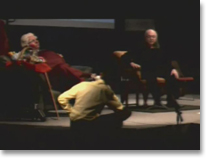 Adi Da wrote The Scapegoat Book in 2005. The
Scapegoat Book is a series of dialogues in the state
mental facility between Raymond Darling and his captor-priest, during
which the latter draws out, and yet refuses, Raymond's teaching
of non-duality, and after which Raymond mysteriously disappears.
Adi Da wrote The Scapegoat Book in 2005. The
Scapegoat Book is a series of dialogues in the state
mental facility between Raymond Darling and his captor-priest, during
which the latter draws out, and yet refuses, Raymond's teaching
of non-duality, and after which Raymond mysteriously disappears.
The Scapegoat Book is a masterful, poetic rendition of how
the ego tries to trap the Divine Person; the Divine Person's Always-Standing
Response to that entrapment or "scapegoating"; and the Divine Person's
Perfect Offering which transcends all of that, and is the Perfect
Inspiration to go beyond all of that with Him. A book that delights
and amuses, critiques and cuts to the quick, again and again.
The Scapegoat Book is Adi Da's "re-working" of the Ashtavakra Gita, reflecting the ego's excuse-making for non-participation or mediocre participation in the process of Divine Realization.
|
Even though death rules to here, Avatar Adi Da Samraj, The Scapegoat Book |
|
Even in the parch of you-invented wilderness of friendless harm, this body — born to here in My First Room, to Bless the deadly world — is always herein Blessed to lie Awake, upon the earnest of My poor bed of institution’s wood. And My thus only bed is far too soft for such as you, who are too fleshed to feel the surface of the lake My heart is laid upon. Avatar Adi Da Samraj, The Scapegoat Book |
|
|
|
|||||||
|
||||||||
|
||||||||
|
|
|
|||||||
|
Adi
Da discussing the staging of The Scapegoat Book
(click on image for enlargement) |
|
Adi
Da discussing The Scapegoat Book
(click on image for enlargement) |
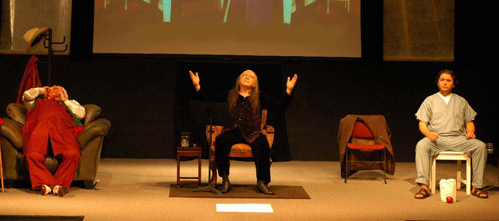
Adi Da reciting from The Scapegoat Book
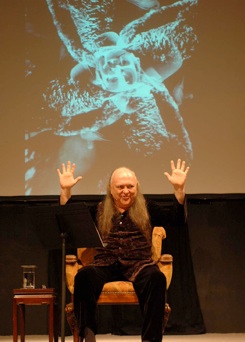
|
Adi
Da instructing devotees rehearsing for The Happenine Book
Adi Da Samrajashram, April, 2006 (click on image for enlargement) |
Adi Da wrote The Happenine Book in 2006. It is the last and longest book of The Orpheum Trilogy.
The Happenine Book again recounts Raymond's life, teaching,
and revelation, but this time through a posthumous collection of
manuscripts and tape recordings, augmented by the Great Sage's paintings,
drawings, and photographs. This collection, left behind by Raymond
"for all of us to find", presents a kaleidoscope of narrative and
non-narrative forms ranging stylistically from traditional to postmodern,
each embodied as space-time capsules of experience, or "happens",
the identification with which is an illusory presumption of the
separate "self" and therefore a fundamental error of human beings,
which must be transcended.
|
If you want to live, I will carry you. Avatar Adi Da Samraj, The Happenine Book |
|
A Horse Appears in the Wild Is Always Already The Case. Avatar Adi Da Samraj, The Happenine Book |
|
Do everything slightly less than once. Avatar Adi Da Samraj, The Happenine Book |
|
There are Japanese who practice a certain kind of aestheticism all the time, and they get into growing perfect flowers — such as the chrysanthemum. And just on the exactly right evening, when a single prized chrysanthemum is due to come into its perfection, and just on the exact evening when not only the perfect bloom occurs, but the full moon, and the night, and the weather all come perfect together — the triumphant gardener will invite friends over, to admire that single perfect bloom, and to speak ecstatically all night about this perfect flower, and the perfection of the night — and the perfection of the perfect, when it comes all together at once. And all who wonder there drink simple green tea together, to keep the perfect flowered night persistent — until just before perfection passes out away. And they move very gently all through the night — Thrilled! Just to be there, in the fragile brief coincidence of natural perfection. Avatar Adi Da Samraj, The Happenine Book |
|
Suddenly! — I am in this infinitely fragrant garden with Rosalie — who is utterly unknown to Me. The moon is full — and the garden is "Bright" Full. And we instantly became mad. Avatar Adi Da Samraj, "The Perfect Garden" |
|
There could be nothing. But, there is this, instead. Avatar Adi Da Samraj, The Happenine Book |
|
Life can be Simpler. Life can be Happy. Life can be Divinely Awake. But Everyman must choose 'It'. And Everyman must do 'It' and not merely talk about 'It'. Avatar Adi Da Samraj, The Happenine Book |
|
Adi Da reciting from
The Happenine Book
Adi Da Samrajashram, April-May, 2006 (click on image for enlargement) |
|
Adi Da reciting from
The Happenine Book
Adi Da Samrajashram, April-May, 2006 (click on image for enlargement) |
|
|
|
|||||||
|
||||||||
|
||||||||
|
|
|
|||||||
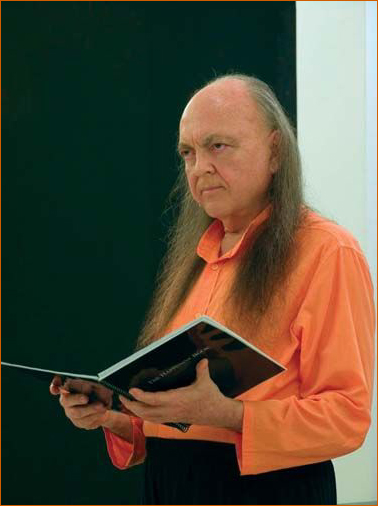
Adi Da reciting from The Happenine Book
Adi Da Samrajashram, April, 2006
| [1] |
Adi Da uses the word "literature" in a specific sense, distinguishing His literary works from the many books He has created about the Adidam Revelation and the Way of Adidam. |
| [2] |
The descriptions of the three books are drawn from Jonathan Condit's essay, "The Final Works of the Divinely Translated Master", in The Eternal One. |
| Quotations
from and/or photographs of Avatar Adi Da Samraj used by permission of the copyright
owner: © Copyrighted materials used with the permission of The Avataric Samrajya of Adidam Pty Ltd, as trustee for The Avataric Samrajya of Adidam. All rights reserved. None of these materials may be disseminated or otherwise used for any non-personal purpose without the prior agreement of the copyright owner. ADIDAM is a trademark of The Avataric Samrajya of Adidam Pty Ltd, as Trustee for the Avataric Samrajya of Adidam. Technical problems with our site? Let our webmaster know. |
